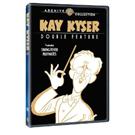|
|
||||
|
by Adam Hakari  In the '30s and '40s, big band leaders were a dime a dozen, but Kay Kyser was something else. Part hoofer, part showman, and part patriot, he did more than just loaf around in a suit while his orchestra did all the work. Eventually, like several of his peers, Kyser made his way to the movies, but he was no background player. He was front and center on the marquee, and it's a pair of his starring roles that the Warner Archive Collection has placed on one toe-tapping disc. The Kay Kyser Double Feature is corn to the core, but the two fun flicks it boasts wouldn't have it differently. Playmates (1941). The phrase "Kay Kyser and John Barrymore meet Shakespeare" may feel like the start of a bad joke, but fortunately, Playmates is far more amusing. Spoofing their own images, Kyser and Barrymore portray themselves, wrangled by their respective publicists into a hare-brained collaboration: a festival of the Bard's best work. But while blowhard Barrymore trains the swing king in the dramatic arts, he also distracts him with a feisty bullfighter (Lupe Velez), while he puts the moves on Kyser's star singer (Ginny Simms). Playmates is the most self-aware of the titles in this set, mostly at the expense of Barrymore, who's a rather good sport when it comes to poking fun at his past escapades. This means the film is a bit busier, storywise, and although the same rehashed situations can get repetitive, it emerges as a mostly well-paced farce. The humor is a hoot, and the musical numbers are a blast, including a finale that gives us a take on "Romeo and Juliet" with some swing in its step. I got a big kick out of Playmates, a classic comedy of errors with a big band beat. Swing Fever (1943). While he has his baton and musicians in tow, Kyser stars in Swing Fever as someone other than himself (in name only, that is). Lowell Blackford (Kyser) is a country lad hoping to make it as a big city music man. The record business doesn't have much use for Lowell's soft melodies, but his hypnotic powers of persuasion do pique the interest of some local gangsters. But will being forced to help rig a boxing match stand in the way of his love for a torch singer (Marilyn Maxwell)? The foregone answer comes at the end of a very preposterous turn of events, but I'd be fibbing if Swing Fever wasn't a harmless good time. It may be another thinly-veiled showcase for both Kyser's troupe and various other acts (which includes Lena Horne, belting out a swoony ballad), but the film does try giving Kyser stuff to do. In fact, he's not half-bad here, his "aw, shucks" persona making Lowell the sort of hapless square you can get behind. Though Swing Fever may be fluffier than thou, its heart is sweet, its jokes are funny, and the Ol' Professor's sounds ensure the joint keeps jumping throughout. |
||
|
© 2026 - ReelTalk Movie Reviews Website designed by Dot Pitch Studios, LLC |



